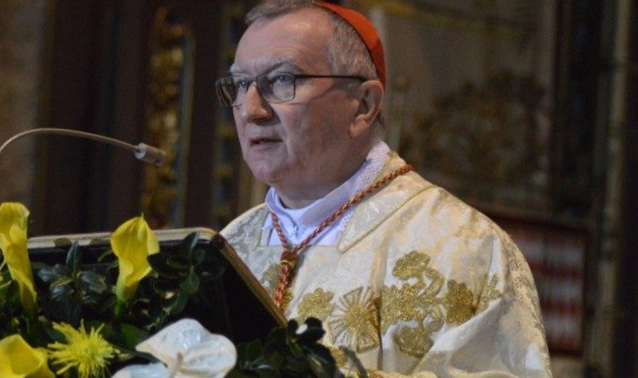The World Day of Migrants and Refugees, called by the United Nations, will be celebrated next Sunday. This evening Sant’Egidio Community, together with other associations involved in the reception of migrants and refugees, organized the Prayer Vigil “Die of Hope,” in the Basilica of Santa Maria in Trastevere. Cardinal Pietro Parolin, Vatican Secretary of State, presided over the Vigil. Present, among others, were Andrea Riccardi, Founder of Sant’ Egidio Community; Marco Impagliazzo, the Community’s president and Father Fabio Baggio, Under-Secretary of the Migrants Section of the Dicastery for Promoting Integral Human Development.
Impressive Numbers
After last Sunday’s Angelus prayer, Pope Francis recalled the “many tragedies of the Mediterranean Sea,” which continue to question the conscience of all (. . . ). Let’s think about this: the Mediterranean has become Europe’s largest cemetery. The numbers, in fact, are impressive: from 1990 up to today, in addition to the missing, 43,390 refugees have died in the Mediterranean or in the land routes of immigration to Europe. A count that was aggravated over the last year, with an additional 4,071 victims from June 2020 up to today, especially in the central Mediterranean, along the route that starts in Libya, but also the Atlantic route, which reaches Spain from the African coasts.
Monsignor Ambarus’ Greetings
Many deceased refugees were remembered by name, but it was impossible to name them all. However, a candle was lit for all. Numerous immigrants of different origin, family members and friends, of those that lost their lives during the crossing of the Mediterranean, were present. In many cases, the emotion was evident. Monsignor Benoni Ambarus, called by all “Father Ben,” former Director of the diocesan Caritas is now Auxiliary Bishop of Rome for Migrants. Bringing the greetings of the Cardinal Vicar Angelo De Donatis, Monsignor Ambarus said that the “shame over the number of dead” in the migrations “is mitigated only by our conviction that every man rises again in hope.”
Shipwreck of Civilization
In his address, Cardinal Parolin commented on the Gospel passage of the storm quelled, the same “that also characterized” the Holy Father’s “extraordinary moment of prayer” in “one of the most difficult moments of the pandemic,” in a deserted St. Peter’s Square. Recalled now is “another tragedy, that of so many lives broken by land and or by sea that were seeking hope.” It is a tragedy that “knocks on the door of our home and our conscience, and which could degenerate into the shipwreck of civilization,” he alerted.
“What happened in the Sea of Galilee could be applied today to the Mediterranean: our sea, place of exchange for centuries, is in a storm. For some time, it has been more a place of clash than a symbol of encounter,” and we are witnessing “a regression of everyday life,” between shipwrecks, dead, instrumentalization and especially much, too much indifference.”
Shocking Awakening
If in the evangelical story Jesus sleeps and the disciples must awaken Him, now the contrary seems to be happening. The Cardinal warned that, in face of this tragedy, “the risk exists of falling asleep to wake up suddenly with shocking images as those of children washed up on the beach of Zuwara in Libya.” ”The Lord seeks to awaken us with patience and delicacy, often through the invitations of the Church,” which “turns her attention to names before numbers, to faces before statistics, to stories before current events.” A continuous call to “help us all to recognize ourselves brothers in the name of God the Father.”
Surmount Fences
Cardinal Parolin stressed that the disciples awakened the Lord “together. It is a basic word to approach the subject of migrations and to seek to overcome the immobility to which interminable discussions lead, irreconcilable differences, party fences, politicized antithetical visions,” which make one “forget the concreteness of every human person.” And on the subject of refugees, “even among believers one is conditioned by politics rather than by the unsettling word of the Gospel. The Christian program does not let itself be subordinated by the opportunity of the moment.”
The Secretary of State said that the ”real dominant thought today turns around the I,” erected as “criterion and measure of one’s rights and benefits. Instead, Jesus invites to trust, to come out of the logic of one’s own to discover that the secret of possessing life is to give it. Competencies and experiences aren’t enough, one must trust God, find in Him the rock on which to anchor oneself. In the storm, the Lord offers us the compass to orient us.” We must “look up, not follow false routes but the way that is indicated to us from above. Look at the shining purity of [Jesus’] message,” which “is winning in God’s way, and not the world’s way. One cannot adore God ignoring one’s brother.”
Call to Europe
We are called “to reject individualistic and abstract proclamations to commit ourselves to solidary courses. Finally, the Cardinal prayed for rulers and leaders of civil society so that they are disposed to a future of peace for the common good” and, in particular, “for European institutions, that they may find a solidary answer. Europe will be cohesive only if it goes beyond individual interests” because, “if it doesn’t find unity in solidarity, it will hardly find it elsewhere.”
Before the conclusive blessing, which the representatives of the various confessions present imparted one at a time, in his final thanks Impagliazzo expressed his “moral indignation over the deafness and blindness of so many” in face of the tragedy of the refugees and he requested again “legal ways through humanitarian corridors” as well as to “look at these people not as a danger but ‘in’ danger, who are in need of our help and our solidarity.”










